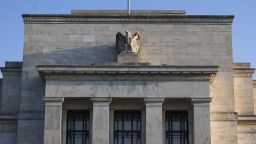The US economy expanded at a remarkably strong pace in the third quarter, despite interest rates at their highest level in 22 years.
Gross domestic product, a measure of all goods and services produced in the economy, grew at an annualized 4.9% rate in the third quarter, the Commerce Department reported Thursday. GDP is adjusted for inflation and seasonal swings.
That’s well above the second quarter’s 2.1% pace and faster than economists’ expectations of a 4.3% rate.
Robust consumer spending fueled growth in the third quarter, a sign of the economy’s surprising resilience in the face of tougher borrowing costs and persistently high inflation. Spending grew from July through September by an annualized rate of 4%, its strongest pace since the fourth quarter of 2021. Americans splurged both on goods and services.
Indeed, packed Taylor Swift and Beyoncé concerts and record tickets sales for the “Barbie” film were a hallmark of this year’s summer months. Americans also spent big on travel.
GDP expanded in the July-through-September period at its fastest pace in nearly two years, defying expectations in the aftermath of the spring banking crisis that the US economy would slip into recession by now.
US Treasury Secretary Janet Yellen cheered Thursday’s report as an example of the American economy’s resilience, but echoed a common view among economists that growth will likely slow.
“It’s a good, strong number and it shows an economy that’s doing very well,” Yellen said during a discussion hosted by Bloomberg TV in Washington. “Let’s remember that it is just one quarter’s number and I’m not expecting growth at that pace to continue.”
Not only have US consumers continued to open up their wallets, but other parts of the economy are also displaying some resilience.
Residential fixed investment, which reflects conditions in the housing market, advanced at a 3.9% annualized rate in the third quarter, Thursday’s GDP report showed. That’s the first time that component contributed to growth in more than two years.
The third-quarter GDP report also showed that business spending — known as nonresidential fixed investment — declined 0.1% in the third quarter. Inventories and federal government outlays also contributed to growth in the third quarter.
Slower growth through December
The US economy’s strength isn’t expected to continue, as it faces a number of headwinds, including soaring bond yields and the resumption of student loan repayments.
“Investors should not be surprised that the consumer was spending in the final months of the summer. The real question is if the trend can continue in the coming quarters — and we think not,” wrote Jeffrey Roach, chief economist at LPL Financial, in an analyst note.
That expectation bodes well for the Federal Reserve, which has raised interest rates 11 times since March 2022 to slow the economy to defeat inflation. Fed Chair Jerome Powell has said the US central bank needs to see “below-trend growth” to be assured that inflation is on track to slow to 2%, the Fed’s inflation target, since red-hot demand could be putting some upward pressure on prices.
So-called “core inflation,” measured by the Fed’s preferred inflation gauge that strips out volatile food and energy prices, rose 3.9% in August from a year earlier. That’s down from a peak of 5.6% in early 2022, but well above the Fed’s inflation goal. Inflation overall also remains above 2%.
A 12th rate hike remains on the table, possibly in December, but the Fed’s main strategy now to defeat inflation is to keep rates higher for longer. The Fed’s latest set of economic projections released in September showed that Fed officials expect fewer rate cuts next year.
Powell said high Treasury yields are currently playing an important role in cooling the economy.
“If you look at financial conditions indexes, they’re showing tightening [and] it’s a lot because of longer rates,” Powell said in discussion hosted by the Economic Club of New York earlier this month.
The 10-year Treasury yield hovered near a key 5% threshold Thursday morning before retreating to 4.89% in the afternoon as investors digested the latest GDP data.
Yellen on Thursday said surging bond yields largely reflect “the resilience that people are seeing in the US economy” and “the notion that interest rates will be higher for longer.”
In addition to the resumption of student loan repayments this month and soaring yields, the United States is also dealing with trillions of dollars in federal debt, two ongoing wars, and the possibility of a government shutdown next month.
One theme of the American economy this year has been resilience, but that will certainly be put to the test in the coming months.






